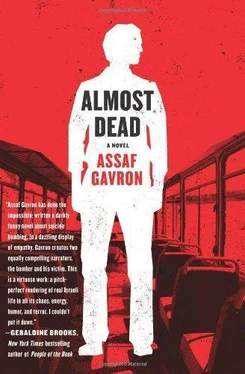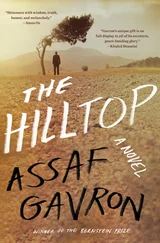‘I know.’
My real journey began there: a week on the road on donkey-back, without a map. Navigating according to hunches and from rough directions given by people, picked up from the roads I crossed, the villages I entered. My beard thickened. My body got thinner and stronger from the effort of riding on a donkey’s back for a week.
We didn’t come across one soldier during the whole time. I realised this when at last we saw a lone soldier from a distance, on a road, waiting to hitch a ride, and suddenly appreciated what a nice week it had been. I got used to eating little. Every morning I bought a few pitas, some cheese, a little olive oil and zaatar , and a bag of carrots, two or three of which I would eat myself, feeding Dayek the rest over the course of the day. When we passed a heap of hay or a field, I stopped and got off Dayek.
I looked into his big brown eyes and couldn’t say no to them. I let him enjoy the plenty, and he ate unstoppably, with huge circular motions of the jaw that showed his smiling tooth and the pinkish insides of his grey lips.
We rode in the hills and the valleys and on paths through terraces of olive trees. Every day I prayed the morning prayer and the night prayer: I might enter a mosque if I heard a muezzin call at a convenient time. I washed only when I came across a tap. We crossed black roads that led to settlements perched on ridges, the neat red-tile roofs shining over the green lawns, and dirt roads or worn-out asphalt bleached almost white leading to hillsides cluttered with dense construction, a mosque tower above and always the field below with its single haggard cow. We spent one night near Asira al-Qibliya, and the next in an arid valley, not having encountered a living soul the whole day. Near Deir Istiya we picked up another blanket and a pair of trousers from a clothes line. I wanted to take things from the settlements we passed on our way, Itamar and then Yitzhar, the industrial zone of Barkan, but I didn’t want to risk getting too close and being shot by a settler.
I was alone with my thoughts — I could talk to Dayek up to a point but there wasn’t much else to do but think, about daily survival issues — food, path-finding, physical pain, places to sleep. I imagined Mother drinking tea with me near the fire, praising it, saying she was happy to see me make something other than bombs. I was sorry that I’d had to flee the village after only a couple of hours with Lulu, and barely having seen Father at all. And I hadn’t even seen Rana. Couldn’t I have just stopped by to explain, to say goodbye, to kiss her? She would have been wondering, perhaps offended. Who knew when I would see her again? And I was worried about a future in a room in Kafr Qasim, with an unknown family who would have to be told some story or other. What would I talk to them about? How would I make a living? What about papers? What would happen to Dayek?
As Dayek and I started to descend from the hills of Samaria towards the lowlands, I knew we were getting closer. Roads crossed our path more frequently and more of the cars on them bore yellow number plates. Villages were becoming small towns; the land was becoming harder worked. Tall copses of eucalyptus trees replaced olives and scrub and I grew more cautious, making diversions through obscure valleys and asking goatherds or workers we met for directions to Arab villages. So we travelled from Deir Istiya to Karawat Bani Hasan, from there to Biddya, then to Mascha and from there to Az-Zawiya, where we arrived around noon. There we waited out a long afternoon. I wanted to leave after dark because I had to bypass a Jewish town on the way, Rosh Haayin. According to workers I asked, I had two hours of riding left to Kafr Qasim.
While we waited, Dayek and I prepared ourselves for the next stage of our lives. I found a field on the outskirts of the village, tethered Dayek to a fence with a long rope, and left him to gorge himself on the grass and alfalfa. I walked into the barber’s in the village and asked for a shave and a very short cut. It was the first time I’d seen myself for over a week, and I couldn’t help but laugh at the beard, the dusty tangle of hair. After an hour I came out of the barber’s a new man, wearing a buttoned shirt I’d stolen early that morning in Biddya. I wondered whether Dayek would recognise this neat young man in the fresh shirt with the smooth face and cropped hair, smelling of aftershave, but the moment I climbed on his back he knew it was me. At dusk we set off on the last leg of our journey, making a wide semicircle around the industrial park of Rosh Haayin: and a couple of hours later I was standing under street lights, on a paved street of well-maintained houses, in front of my new home in the village of Kafr Qasim.
In the nights, memories and theories and Guetta and Shuli ricocheted around the walls of my skull, crashing into each other. In the mornings I’d spend long minutes under the shower trying to chase the fog from my brain. I was slow to see it, but I think now that Bar was trying to keep me going with the Guetta investigation. First thing I did on the drive to work was call him; he would also be driving to work from Tel Aviv. Sometimes I’d see him mid-conversation, revving impatiently at a zebra crossing with an Every Second Counts sticker above his petrol cap, or pelting down the fast lane to Rosh Haayin, both of us talking into our hands-frees about Guetta, about Binyamin Warshawski and his wife Dvora, or Tamer Sarsur and his brother Amin. But I’m getting ahead of myself. At work we kept up a steady back and forth of emails on the subject: Internet search results, falafel lunch meetings…Shuli’s death had almost stopped me. But Bar had such energy he drew me along in his slipstream.
When I wasn’t working on Guetta, I contributed to Time’s Arrow by putting some serious hours into computer gaming. I engaged Ron, who’d announced he was leaving the company, in various forms of combat. When Ron wasn’t available, I fought myself. Bar and I often went straight from work to Bar BaraBush, where we’d continue discussing the case and other stuff. It was easy for Bar, who had a huge network of friends but lived on his own, and who could get away with not working at Time’s Arrow because his manager, Ron, didn’t care any more. For me it was a little harder. Duchi thought I was having an affair, and when she realised I was with Bar, accused me of having an affair with him (Talia Tenne also asked more than once whether something was going on between us). Plus I had the problem that I was working closely with the managing director of our company.
I had to fly to Croatia, to a company named Connect, which wanted an ultra-fast search engine for their databases. The trip’s goal was ostensibly to get a dialogue under way between our technical people and theirs. But Jimmy wanted me there to sell them our voice recognition system: ‘To flog them something under the table, Croc, without them even noticing, OK?’
I don’t know how I managed to forget. Maybe because my partner for the trip was Amit from R&D, who I’d never travelled with before. When I went with Jimmy or on my own, he used to drive me crazy for a whole week beforehand. When I travelled with Yoash Green, we prepared for our meetings together. But with Croatia it sort of slipped through the net: a small, uninteresting customer, lots of technical stuff and Amit, with whom I had no regular contact. When Amit rolled his little suitcase into my room and asked whether I was ready, I lifted my eyes from the carnage on my screen and said: ‘What for? Where are you off to?’
The morning after my meeting with Gadgid, after my sleepless night of driving in circles, thinking in circles, Jimmy called me into his office. He stood by the window, as if gazing out at the Mediterranean and the Tel Aviv skyline as he used to, though all he could see through this window was the rest of the business park, a field or two with a skinny donkey cropping brown grass and the sun-beaten hills vanishing into a grey heat haze over Samaria. ‘Franklin Roosevelt once said,’ Jimmy declared, ‘“Lost ground can be reclaimed — lost time never.”’ Oh, right, I thought, it’s one of those speeches. He turned and stared at me. I wilted into a chair. ‘These days, we expect a lot from life. We want to work in an interesting, fulfilling, well-rewarded job; to be in a meaningful intimate relationship; to keep abreast of politics, to read books, listen to music, watch movies, visit exhibitions, watch sport, play sport, explore our spirituality, our sexuality; to have a wide and various circle of acquaintance, to dance, cultivate a garden, cook, keep fit, raise our families.’ He walked around his desk and sat in front of me, then bent towards me and, to my amazement, took both my hands in his. ‘To travel, at least once a year, to somewhere you’ve never been, to stay in touch with friends from all periods of your life, from all around the world, to continually make new ones. It’s a hell of a list, Croc. And when I ask myself “Which of these things am I trying to achieve?” the answer is “all of them”. Are you?’ I nodded distractedly. All night and all morning, the memories Gadgid had summoned had been jabbing and taunting me, refusing to let me alone. God’s finger poised above his buttons, me in the watchtower and Danny Lam in his jeep in Lebanon, inching forward into the puddle…
Читать дальше












